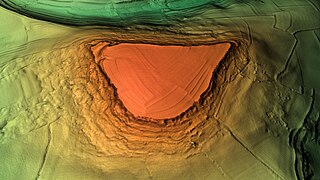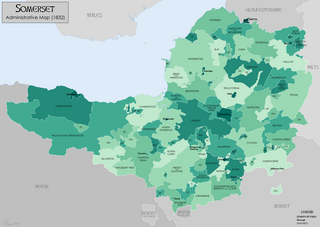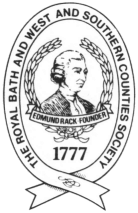
The North Somerset Show is an agricultural show held annually in May at Wraxall, North Somerset, England. It is organised by the North Somerset Agricultural Society.

The North Somerset Show is an agricultural show held annually in May at Wraxall, North Somerset, England. It is organised by the North Somerset Agricultural Society.
The society was formed out of the North Somerset Ploughing Society in 1840 by a group of farmers. [1] [2] The sole purpose was to promote and showcase agricultural development to both those involved in farming and agriculture as well as to promote an agricultural awareness to the general public.
The event used to be held at Ashton Court in Bristol until the society purchased its current 130-acre site, which was previously part of the Tyntesfield Estate, in 2002. [3] Many other events are also held at this site throughout the year such as a Ploughing Match and Craft and Produce Show.
Many of the basic traditions can still be found in today's show with the emphasis still being very much on agriculture. The showing of livestock, horses and demonstrations of local and rural skills and crafts still play an important part of the show.
The 2019 event was the 160th show. The show was not held in 2020 or 2021 due to the coronavirus pandemic. [4] [5]
After an absence of three years the 162nd show was held on 2022.
The 2023 show will be held on Bank Holiday Monday 1 May 2023. [6]

Somerset is a ceremonial county in South West England. It is bordered by the Bristol Channel, Gloucestershire, and Bristol to the north, Wiltshire to the east and the north-east, Dorset to the south-east, and Devon to the south-west. The largest settlement is the city of Bath, and the county town is Taunton.

South West England, or the South West of England, is one of the nine official regions of England in the United Kingdom. It consists of the counties of Cornwall, Dorset, Devon, Gloucestershire, Somerset and Wiltshire. Cities and large towns in the region include Bath, Bristol, Bournemouth, Cheltenham, Exeter, Gloucester, Plymouth and Swindon. It is geographically the largest of the nine regions of England with a land area of 9,203 square miles (23,836 km2), but the third-least populous, with approximately 5.7 million residents.

The Bristol Channel is a major inlet in the island of Great Britain, separating South Wales and South West England. It extends from the smaller Severn Estuary of the River Severn to the North Atlantic Ocean. It takes its name from the English city and port of Bristol.

North Somerset is a unitary authority in the ceremonial county of Somerset, England. The council is based in Weston-super-Mare, the area's largest town. The district also contains the towns of Clevedon, Nailsea and Portishead, along with a number of villages and surrounding rural areas. Some southern parts of the district fall within the Mendip Hills, a designated Area of Outstanding Natural Beauty.

Little Solsbury Hill is a small flat-topped hill and the site of an Iron Age hill fort, above the village of Batheaston in Somerset, England. The hill rises to 625 feet (191 m) above the River Avon, which is just over 1 mile (2 km) to the south, and gives views of the city of Bath and the surrounding area. It is within the Cotswolds Area of Outstanding Natural Beauty.

Portishead is a town and civil parish in the North Somerset unitary authority area, in the county of Somerset, England. With a population of 26,366 at the 2021 Census, the town is located on the Severn Estuary opposite Cardiff and Newport in Wales. The town is 8 miles (13 km) to the west of Bristol and 18 miles northeast of Weston-super-Mare.

Somerset is a historic county in the south west of England. There is evidence of human occupation since prehistoric times with hand axes and flint points from the Palaeolithic and Mesolithic eras, and a range of burial mounds, hill forts and other artefacts dating from the Neolithic, Bronze and Iron Ages. The oldest dated human road work in Great Britain is the Sweet Track, constructed across the Somerset Levels with wooden planks in the 39th century BCE.

Ashton Court is a mansion house and estate to the west of Bristol in England. Although the estate lies mainly in North Somerset, it is owned by the City of Bristol. The mansion and stables are a Grade I listed building. Other structures on the estate are also listed.

The National Ploughing Championships or NPC, previously known as The National Ploughing Championships Machinery & Livestock Exhibition, is an outdoor agricultural show in Ireland incorporating a ploughing contest. Held every September, it draws over 1,700 exhibitors and had 297,000 visitors in 2019.

Chew Valley Lake is a reservoir in Chew Stoke, Chew Valley, Somerset, England. It is the fifth-largest artificial lake in the United Kingdom, with an area of 1,200 acres (4.9 km2). The lake, created in the early 1950s, was opened by Queen Elizabeth II in 1956. It provides much of the drinking water for the city of Bristol and surrounding area, taking its supply from the Mendip Hills. Some of the lake water is used to maintain the flow in the River Chew.

Wraxall is a village in North Somerset, England, about 6 miles (10 km) west of Bristol. Until 1811 the parish of the same name also included Nailsea and Flax Bourton. The village is now within the parish of Wraxall and Failand.
Thatchers Cider is a family-owned cider maker in Sandford, North Somerset, England.

Churchill is a village and civil parish in the unitary authority of North Somerset, part of the ceremonial county of Somerset. It is located on the western edge of the Mendip Hills, about 8 miles (12.9 km) east of Weston-super-Mare, and about 15 miles (24.1 km) south-west of Bristol. The parish, which includes the village of Lower Langford and the hamlet of Upper Langford, has a population of 2,250.

The Mid-Somerset Show, also known as Shepton Show, is a one-day agricultural show held annually in August on a site at Shepton Mallet, Somerset, England. Founded over 150 years ago, the show displays and celebrates agriculture and livestock rearing, crafts and hobbies, local heritage and farming history. Competitions are held for animals, produce and handicrafts in a wide range of classes. Other attractions include trade stands, craft demonstrations and amusements.

Noah's Ark Zoo Farm is a 100-acre (40 ha) zoo developed on a working farm in Wraxall, North Somerset, 6 miles (9.7 km) west of Bristol, England.

The Royal Bath and West of England Society is a charitable society founded in 1777 to promote and improve agriculture and related activities around the West Country of England. Based at the Royal Bath and West of England Society Showground near Shepton Mallet in Somerset, the society is a registered charity in England and Wales.

John Billingsley (1747–1811) was an agricultural pioneer in 18th-century Somerset, England.

The Royal Bath and West is an agricultural show for the West of England. Held every year at its permanent show ground near Shepton Mallet, Somerset, it is one of a number of County shows in the United Kingdom and is a four-day show. In 2009 and 2010 it attracted over 155,000 people.
Agriculture has historically been the primary industry of the English county of Cheshire. Dairy farming has predominated, and the county was particularly known for cheese-making.
The Bristol International Exhibition was held on Ashton Meadows in the Bower Ashton area of Bristol, England in 1914. The exhibition which had been planned since 1912 was a commercial venture and not fully supported by the civic dignitaries of the city which caused difficulties raising the funds needed. Most of the construction of the venues was from wooden frames covered by plasterboard and occurred in just 2 months prior to opening. It opened on 28 May 1914 was closed on 6 June. Further funding was raised and the exhibition reopened, but continued to struggle with lower than expected attendance and, following several court hearings, finally closed on 15 August just after the outbreak of World War I.